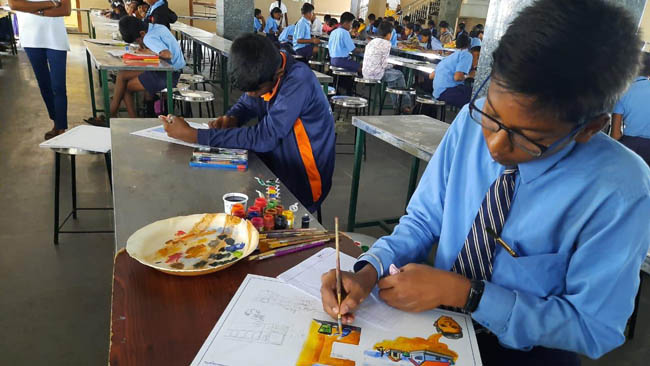
Ramanagara, December 20, 2019: As a part of its unique CSR initiative, Project ABCD (A Behavioural Change through Demonstration), Toyota Kirloskar Motor (TKM), today, organized a district level quiz competition for the third consecutive year witnessing participation from over 4074 school children from 118 schools. Supporting Government of India’s ‘Swachh Bharat Mission’, Project ABCD was rolled out in the year 2015, implemented in 1,004 schools covering 58,719 children at Ramanagara district in Karnataka.In-line with Government of India’s national campaign, ‘Swacch Bharat: SwacchVidyalaya’, Project ABCD aims to spread awareness and promote safe Water, Sanitation and Hygiene (WASH) practices among school children.
The event was graced by Mr.Ikram, IAS, Chief Executive Officer, RamanagaraZilla Panchayat, Mr. Naveen Soni, Vice President, Toyota Kirloskar Motor along with the senior management representation from TKM.
Through Project ABCD, over 58,719 children from 1,004 schools in the district have been trained so far on better hygiene practices, importance of hand washing, and usage and maintenance of toilets. Over the years, this project has substantially expanded its reach across Magadi, Kanakapura, Ramanagara and Channapatana, enhancing the awareness by training the teachers and children on the importance of sanitation and basic hygiene.
Commemorating the success of Project ABCD, the quiz program supports its mission to enhance the knowledge on personal hygiene and sanitation among school children. It further motivates them to sustainably practice good hygiene and advocate these practices to other school children and community members. This competition is developed to evaluate the level of awareness among school children through various activities including Quiz, Painting, etc. It also acts as a great platform to check the effectiveness of the sanitation campaign on WASH practices and general knowledge about sanitation and hygiene amongst school children undergoing the ABCD program at their respective schools.Additionally, it helps the school children to openly discuss, share their views and knowledge about the WASH practices; motivating others.
This year, the competition witnessed participation from 477 schools, including lower & higher primary and high schools. Through multiple rounds, 216 schools were shortlisted for a Taluk level competition. Out of these, top 32 schools were selected from each Taluk for a district-level activity. Today’s event marks the final leg of the quiz competition which identified the top three schools emerging as winners at district level. Additionally, another three prizes each for GHS and GHPS were awarded at the taluk level.
Congratulating the winners and sharing his thoughts on this unique initiative, Mr.Ikram, IAS, Chief Executive Officer, RamanagaraZilla Panchayat, “Today, inculcating a positive attitude towards hygiene and sanitation, especially in rural regions, has become a matter of paramount importance. TKM’s Project ABCD has played an instrumental role in reaching out to school children to drive the message of better sanitation and hygiene practices. We appreciate TKM’s efforts in providing a platform to these young minds to enhance their knowledge, and inspire a mindset change regarding cleanliness and sanitation. The enthusiasm and awareness levels displayed by these kids is truly remarkable and reflects the positive behavioural change we intend to bring in to the society. It is indeed a matter of honor to be a part of such a noble cause.”
Sharing his thoughts, Mr. Naveen Soni, Vice President, Toyota Kirloskar Motor said, “Sanitation and hygiene in schools improves attendance, health and the overall development of the children. It establishes a positive hygiene behaviour and offers the opportunity to introduce better practices in families and communities.We see this quiz competition as a great opportunity to engage with school children and assess the effectiveness of Project ABCD in raising awareness about health and sanitation among them.As we all are aware, lack of sanitation facilities cause serious health hazards in the local communities, especially affecting women and adolescent children. As a responsible corporate, our goal is to inspire, influence and nurture the young generation to help solve this critical issue. It is heartening to witness rising sanitation awareness and the project’s impact on the behavioural changes among these children. We will continue working with the government authorities and concentrate our efforts in creating a sustainable and healthy world for all.”
The primary objective of Project ABCD is to curb one of the most crucial concerns of our country i.e. open defecation. As a result of the ABCD program, and motivated by TKM’s participation and children’s determination, individual families have started championing community sanitation. With government scheme linkages for toilet construction, residents have built their own sanitation units, with no monetary support from TKM.
Owing to TKM’s girl child sanitation initiatives and implementation of Project ABCD, school missing hours have also drastically reduced to zero (Earlier, an adult girl child used to go to their respective home for toilet usage and miss the school for over one-two hours).As per TKM baseline survey, of the 58,719 children covered as part of this program, 1,288 still do not have access to toilets at their home. However, through various activities conducted as part of Project ABCD, TKM is motivating these children and their parents to construct household toilets.
Till date, TKM has constructed more than 890 units of sanitation facilities in 293 government schools across India, including: 124 units in Varanasi (UP), 592 units in Ramnagara district, 80 unit in Bangalore (Karnataka) and 94 units in Vaishali (Bihar).Furthermore, earlier this year, Project ABCD was taken as a case study by two IIM professors and published by IVEY Publishing, a leader in providing business case studies with a global perspective. The case study then also made its way to Harvard Business Review case collection.